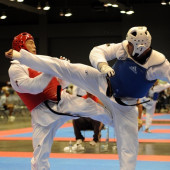Mr Brooks was an active Taekwondo competitor and a long-time member of the Taekwondo Union of New Zealand (TUNZ). He represented New Zealand in the 2005 World Championships and the 2006 Commonwealth Championships.
In September 2008, Mr Brooks was suspended by TUNZ. The grounds for his suspension were contested. From early 2014, Mr Brooks and his supporters made requests under the Privacy Act 1993, for documents relating to his suspension.
In mid 2014, Mr Brooks sought to renew his membership of TUNZ. After some initial correspondence, TUNZ returned Mr Brooks’ membership payment and explained that membership was not automatic, but went on to state that the committee would consider a formal application with supporting material.
In December 2014, Mr Brooks made three requests for his personal information held by TUNZ. The first request was made on 11 December, and the other two requests were made on 17 December.
First request
The first request asked for all information held about him – in addition to specific details about the meeting that considered his membership application.
TUNZ’s secretary responded promptly on 17 December, saying that there had not in fact been a meeting to consider his membership application, since his application had been considered by email. Further, TUNZ considered that it had previously provided the information Mr Brooks sought about earlier events.
The Human Rights Review Tribunal found that there was a great deal of information that had not been earlier provided to Mr Brooks. It also noted that the fact that some information may have previously been released to Mr Brooks was not on its own a permissible ground for denying access to personal information. Refusal of an access request had to be based on the grounds set out in sections 22 to 29 of the Privacy Act.
Second request
After receiving the TUNZ secretary’s response on 17 December, Mr Brooks made a request for “the email correspondence in which I was discussed and all emails relating to my request for membership”.
Third request
A few minutes later, Mr Brooks made a third request, specifying “email correspondence between TUNZ and Dave Aldridge regarding my application to join TUNZ”. Mr Aldridge was a friend who had supported Mr Brooks’ application.
The Tribunal noted that it was not strictly necessary for Mr Brooks to submit these latter two requests, as his first request extended to all information TUNZ held about him.
Response by law firm
At this point, TUNZ instructed the law firm Gibson Sheat to respond to the requests, which they did on 30 January 2015. The requests were refused on the grounds that the information had already been provided, and that the information requested was “evaluative material” (s29(1)(b)).
Mr Brooks complained to the Privacy Commissioner.
Privacy Commissioner’s preliminary view
The Privacy Commissioner’s investigation led to discussion between the parties and clarification of certain points, including that the information requested was indeed ‘personal information’ about Mr Brooks. The preliminary view of the investigator in July 2015 noted that some requested information was covered by legal professional privilege and so could be withheld on that basis.
Eventually, some 700 pages of correspondence relating to Mr Brooks was collated and released to him on 3 September 2015. Although it agreed to release the information, TUNZ maintained its position that it had been justified in relying on section 29(1)(b) to withhold the information.
Tribunal hearing
Mr Brooks challenged the withholding grounds relied on by TUNZ and sought a number of remedies, including a declaration and damages of $30,000. He later modified this position; seeking only a declaration of an interference with his privacy.
TUNZ also modified its stance, conceding that only four pages of information could be considered to be evaluative material.
Tribunal’s finding of undue delay
The Tribunal formed the view that there was no proper basis for withholding Mr Brook’s information from him and that the delay in providing him with the information was unjustified.
The Tribunal noted that an agency must make a decision on whether an access request is to be granted “as soon as reasonably practicable” and in any case not later than 20 working days (section 40). However, it pointed out that Privacy Act does not require the information to be provided at the same time. “Indeed the Privacy Act does not set a fixed time within which access to the requested information must be given.” It will be an interference with privacy is access is “unduly delayed” and there is no proper basis for delay (section 66(4)).
The information was not provided until September 2015 and the Tribunal found this to clearly represent undue delay.
TUNZ argued that it had a genuine belief that the documents were able to be withheld on the basis that they were evaluative material. TUNZ also pointed out that it was a voluntary organisation with little or no prior experience of access requests and limited time and resources to fulfil the request.
The Tribunal commented:
“It is not a defence that the agency honestly but mistakenly relied on one or more of the withholding grounds… Resource issues, while relevant, are not determinative... TUNZ cannot rely on its mistaken application of the provisions of the Act to justify the late delivery of the information on 3 September 2015."
Remedy
As sought by Mr Brooks, the Tribunal issued a formal declaration that TUNZ had interfered with his privacy. It went on to note that TUNZ was “fortunate Mr Brooks abandoned his request for damages as TUNZ was at real risk of having an award made against it”.
No costs were awarded.
Image credit: US Army Taekwondo champion via Wikimedia Commons.
Human Rights Review Tribunal,
IPP6 - access
Back

